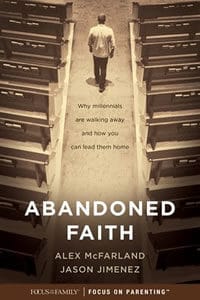Opening:
John Fuller: Today on “Focus on the Family,” we’re going to take a look at the Millennial generation and what they believe about God and church and faith. And you might have heard comments like these.
Clip:
Girl #1: I have some problems with the Bible because there’s a lot of things in there that we do not follow, and people pull things out of context a lot—random verses that don’t really apply to the world as it is today.
Guy: Well I think that just because I don’t consider myself Christian doesn’t mean that I can’t see Him as a role-model for myself and a leader for myself if He was a real person.
Girl #2: I don’t know, I’m sometimes put off by the dogma of organized religions. (Laughing) You know, I don’t understand like some of the specific rituals don’t really resonate with me.
Girl #3: Everything is like happy and Jesus loves you and Sunday school and you don’t really get anything that’s real about Christianity in this day and age because you’re naïve and you’re a child. But when I grew up, I was disillusioned from the idea of church as something that I wanted to be a part of.
End of Clip
Jim Daly: John, statements like those we just heard, especially for a parent, are so difficult, ’cause you’re pouring into the life of your child; you’re hoping they catch it, that they catch the faith, that they embrace it as their own. And then 16, 17 your start to see signs that maybe they are not getting it. And then you hit your head on the pillow at night and the two of you, the spouse and you, begin to talk. “What’s wrong with Johnny? What’s wrong with Mary? It doesn’t seem like it’s coming together.”
John: What’d we do wrong?
Jim: What’d we do wrong? So many parents are living in that space, and we are gonna discuss that topic today of how to help your children embrace the faith, grab ahold of it, and to own it for themselves, which is the goal. And sometimes that’s gonna take a fearful step, which is not controlling it.
John: Uh-hm, right, ’cause we’re not in control, are we? There’s that free will thing going on, and kids have to own that. John: And we’ve got Dr. Alex McFarland and Jason Jimenez in the studio with us today, and they have a passion for teaching and training young adults about biblical truth.
Alex is a religion and culture expert. He’s an author and speaker and radio host and is the director at the Apologetics and Worldview Center of North Greenville University, and he’s served for a number of years here at Focus on the Family as our teen apologetics expert. And Jason is a former pastor. He writes and speaks about this topic. And together they’ve written a new book for Focus on the Family that you’ll hear more about today. It’s called Abandoned Faith.
Body:
Jim: Welcome to Focus.
Dr. Alex McFarland: Thank you, it’s great to be here.
Jason Jimenez: Yeah, we’re glad, you guys. Thank you for having us.
Jim: Okay, this is something close to a lot of parents’ heart, especially the parents of teenagers, not that I would be one (Laughter), but that’s exactly where I am.
John: You have a couple of them, don’t you?
Jim: You’ve got one or two, too, don’t you? So as you’re helping your children to embrace the faith, there are so many speed bumps along the way. Culture is pulling at them; so many things are pulling at them, pulling them away from those truths that we hope that they will embrace. What does the landscape look like? What’s the research showing us? How many kids are walking away from the faith today when they turn 18, 19, and go off to college?
Alex: Well, there are a lot. I mean, there is some data out there that looks pretty scary, and I mean we should be concerned, and we should always, in every generation, be, you know, diligent about passing the baton of faith to the next generation. But in the book we talk about some of the realities and the challenges of discipling our children and teens. But there really is some good news, and I want to talk about that as well.
When I was working with Focus, now 14 years ago, and my speaking and traveling was really growing and I was out more and more, I began to hear these stories of distraught parents that would say, you know, “We don’t get it. You know we raised our kids in youth group and church and maybe even Christian school, and now they’re at the university and they’re seriously doubting that God exists or questioning their Christian faith.”
And so I, for a long time, have had a real burden to say a couple of things. There is hope. And that’s what we want to set forth very clearly from the get-go. If you’re fearful that you’ve got a prodigal or you are the parent of a prodigal, know this: there is hope and that there is some good news. But, at the same time, the culture nowadays, I mean there are some very serious spiritual challenges that believers of any age face, and that’s very pronounced among the teens.
Jim: Well, and some of that research will show that up to maybe 70 percent of kids going off to college or leaving the home will walk away from the faith. Now Dr. Kara Powell at Fuller has done some back research on that, looking at when do they return to the faith, and thankfully, about half by the time they are 30, and I don’t think any of the research she’s done has gone beyond 30 years old, but over a lifetime, to your point, the good news is many come back. They hit their point; they hit their valley, and then they reach out to the Lord and, just like the Scripture says, that His Word does not return void, and I think it’s very true in this environment.
Jason, as a former pastor though, you’re, you lived it. You saw families in great despair. It doesn’t sound very comforting when you have a prodigal child to think that it could get better. It just, at times, does not feel like, A, God is connected here, that He knows the issues that we’re going through, or B, that there is any light at the end of the tunnel in the middle of this, especially a 20-something that has gone off the rails, and you weep at night as a parent thinking, What did we do wrong? Where did God let us down? And what’s the problem with our child? Why [are] Bob and Nancy’s kids doing so well and our kids aren’t? There’s a lot in there.
Jason: There’s a lot in there. And one thing we appreciate what you guys do on the radio show, Jim and John, is to focus on these issues. And one of the things we do in the book, Abandoned Faith, because you asked the question earlier, the landscape, you’re talking 80 million. This is the largest generation, the Millennials–
Jim: Eighty million?
Jason: –80 million, in American history. So to your point with Dr. Kara Powell, she’s now examining the older end. You’re talking about 1984 to about 2004 as the time in which the Millennials were raised, were growing up.
The good news is, there is not only hope for the Millennial as they do get older, because they are searching, they are very spiritual but they are misguided; they do lack a biblical worldview. Because, as we show in the book and we examine the data, their parents didn’t have a biblical worldview, so there is a lack of transferrable faith in them. So as they get older and they are in their 20s, they are asking some of these questions now, and they are engaging on some level, and we’re here to say one way to help bring this abandonment back home and to start bringing some healing with this generation is let’s first focus on the regret, the pain, the “lostness,” the abandonment, the fear of rejection that a lot of the parents are faced with, and that’s what this book does.
Jim: Kind of the honesty is what I’m hearing you say.
Jason: Yeah.
Jim: And not to be a hypocrite, right?
Jason: Yep, absolutely.
Jim: Because I think this Millennial generation, they’re looking for what’s real, and we even heard that in the setup with that one girl speaking about that, that when she got older she just didn’t feel faith was real, and that’s a sad thing.
Jim: How do we address this? We often, with parenting particularly, we look at a very formulaic approach. We set boundaries. We discipline. There’s this formula that we have in our head that if we do A + B then we get C, the output of a wonderful, perfect maybe even, child. That’s not the plan, is it? I mean God had Adam and Eve. He was the perfect parent. And His kids went the wrong direction.
Alex: Sure.
Jim: How do we, as parents, embrace messy? That God gave each of us a free will, including our children? I know that scares, even saying that scared me, John. But it’s true. Our kids have free will. We can’t fireproof them; we can’t spiritually proof them, and they’re gonna have to live their lives. What do we do, as parents, to do the best job we can do to give our children the best chance that they have at understanding the world through a biblical lens?
Alex: Great question, Jim, and I think one of the best things we can do, the starting point has got to be that we role model it ourselves.
Jim: Is that the most important thing to do?
Alex: Well, obviously prayer, you know, and we understand that as much as we love our kids, the Lord loves them even more, but I really do think that passing the faith on and building a child that will go the distance with Jesus begins that they see authenticity in our own life.
Two Scriptures that we talk about in the book. One is Deuteronomy 6, where it says, you know, “Post the Word of God on the door of your house and keep it ever in front of your eyes.” But I love Exodus 13. It’s very poignant, actually. It’s a very touching Scripture that says, “When it comes to pass that your son will ask you, ‘Why do we do these things,’ that you will say, ‘Pharaoh wouldn’t let us go. God delivered us.’”
The import of Exodus 13 is that your child is saying, “How do I have what you have? I see something in you, how do I have what you’ve got with God, Dad or Mom?” And so I think when our kids see that Jesus Christ is the No. 1 priority in our own lives, it’s not, you know, legalism or ritual, but it’s this passionate relationship, the old saying, “More is caught than taught,” and we want our faith to be something that they can’t help but recognize.
Jim: So again, for the parents who are struggling because they have a child who maybe they’ve seen things that are inconsistent in the faith, what are those steps? I want some really concrete steps. What do I have to do when I see my kids tonight around the dinner table? How do I start afresh?
Jason: Yeah.
Jim: I’m expecting to hear humility. Tell your kids where you have blown it.
Jason: Oh, yeah.
Jim: I think so often we, as parents, we try to project perfection, and it’s not there and your kids know it.
Jason: Well, yeah, here’s a sad reality. I mean like you said, the answer is, as the Bible says in 1 John 2:5, to walk as Christ walked. He is our example. We are to, in the fullness and stature of the fullness of Christ, we get together in the local body. Our process of sanctification is to become more like Jesus. The reality is, when you talk to the average Christian, particularly parents who’ve been raising these teens who are looking at a lot of these mistakes and then rejecting the faith, they take it solely on them. So when you talk to this parent, they are the one saying, “I haven’t been a good example.” So to your point, Jim, how do I do that? I know look at the Bible, pray, try to be that example. But I haven’t been the best example.
You talk to the average man who’s maybe listening to this show right now who professes to be a believer, maybe supports this ministry, maybe have read a few of the books; he’s a business guy; he’s traveled a lot through the years; he’s provided for his family. I’ve sat with many of those people, as you guys have, and they will tell you, “I have major regret because my wife did most of the parenting raising and I was out there making a living, trying to provide for my family. Now that my kids are older, if I wasn’t really the spiritual leader then, how do I become the spiritual leader now?” So here’s one of the first things we tell them in the book is accept responsibility.
So we’re trying to tell parents take responsibility. Don’t take ownership of everything; it’s impossible. We have free will; our kids have free will; and the older they get, they’re not always going to take your advice; but they are gonna look at your example, and that’s where we have to show repentance.
And so real quickly I’ll tell you guys, we do one thing; it’s a mission statement in our home. It’s very easy with our kids. It’s an acronym, LOVE. We put it in the book. Make sure that we laugh as a family. Laugh! It’s a medicine to the soul, the Bible says. No. 2, and O in LOVE is be open. Be transparent. Look for opportunities. You know when dads are open, when dads take the opportunity to break through the discomfort and kind of the awkwardness and just kind of be open and share a thing or two about their life or maybe what they’re going through, that really speaks to the kids and to the mom.
V is value one another. Everybody has a role in the family. So now the older the kid goes, we know that almost 70 percent of Millennials are still living at home; over 50 percent of them are guys and less than 40 percent are girls, but you add the numbers together, a lot of Millennials are still living at home. So though we don’t discipline them like you once did, we have to adapt and say, “How am I valuing my child, who is an adult now in the home?” Because they do play a role. You may not want them to be there that long, but they are still a family member. And then E is encourage them.
We need to make sure that we are always, every day when you’re sitting around the dinner table, I would say something, Jim, is that it’s not about doing family devotions. I think we become legalistic about that and we’re trying to cram something in there, 5- or 10-minute thing, and that can be bad because you’re setting a precedent that if we do 5 minutes of Bible during the day, we’re good, you know, a kind of checklist.
If you encourage each other in the Spirit of the Lord and you show them what it looks like to have intimacy with God and be open and do all these things that we mentioned, you are gonna see a major change that’s going to transpire.
Jim: That’s a devotional.
Jason: That’s a devotional in itself.
Jim: But I can understand the personality kind of plays into this, because my wife, Jean, is biochemistry, she’s black and white; she loves more formal time together. That really encourages her.
My two teenage boys like the more on-the-go devotional, “Dad, look at that deer!” “Hey, have you ever thought about God’s creation?” That’s where they tend to thrive, and they bristle under the 7:00 to 7:30 thing. How do you adapt so you’re as effective, and how do parents talk to each other to say, “Okay, it’s okay. We can relax here a little bit. It doesn’t have to be every night at 7:00,” but you can do some things differently and still get a better result?
Jason: Well, before, Alex, you say something, one of the things we talk about in the book is just as we look to in Psalm 73 and Deuteronomy 6, look for opportunities through the day. Just have a relationship. I think a lot of times parents, we’ve got to remember we’re the No. 1 influencer in our kids’ life, and one thing we remind them in the book, more so now when they’re in their 20’s than when they were actually in their teens.
I just came out of a conference this weekend, and a lot of parents of Millennials, they feel awkward. “I don’t want to invade their space.” Or “I want to have a relationship, but how do I do that?” And they still even live at home, but they are, of course, on their own schedule. They hang out with their friends; they go to work, and they don’t really interact so much, maybe a meal or two, but even then, Jim, they weren’t really having a lot of meals together. That was one of the things, right, because sports and other things have replaced that.
So I always remind parents you’re the No. 1 influencer. Just find something that you guys share in common, maybe memories that you have as a family, or something your child likes to do—boy or girl, it doesn’t matter, son or daughter—and look to do that at least once or twice a month, but during the day, if you do have some interaction, a text, a reminder to them. You know there are ways that we can still interact with them. But you know what? I’ll tell you, a lot of parents are intimidated.
Jim: Well, I was going to make that point, because I think a lot of parents don’t see themselves as the No. 1 go-to source for their teens particularly, because they don’t have that relationship, or it’s strained, and they don’t see it as the normal—
Alex: But they still are.
Jim: –pull away. But they still are, so they have to see that and understand that.
Alex: Yeah. I mean by God’s grace, I mean, I’m in front of at least 100,000 teens a year, and we do surveys at all of our events; we do, you know, these questionnaires; and still mom and dad are the No. 1 voice.
Jim: Yeah.
Alex: On spiritual and moral and life decisions, mom and dad has the most clout of any voice in the life of their young person. They really do.
John: Well, we’re talking today to Jason Jimenez and Dr. Alex McFarland on “Focus on the Family.” Your host is Jim Daly. I’m John Fuller. And our guests have written a book, Abandoned Faith, and we have that a focusonthefamily.com/radio.
And that influence that a parent has over a teen, is that still true when they hit their 20-, 30-year mark? I’ve got some kids in my 20’s and I’m not sure that I’m influencing them all that much. I only see them a few times a week.
Alex: Do you know, John, I actually believe that it deepens the longer we live, the more. And I hear this from the mid to late 20’s and the 30’s. ‘Cause you get out there in the crucible of life and you’ve got all of these responsibilities and stresses, and I’ve heard so many late-20’s saying, “I wish I could have one more conversation with my dad,” or “Oftentimes, no matter where I am, I try to call.”
I believe—and this is designed by God—but that influence and that gentle–sometimes not so gentle–influence that a parent can have, it does remain, and we need to leverage that.
But sure, you’re respecting their space, but they need to respect that you are still providing, even though they might chronologically be a grownup, but economically they are still dependent on you, you need to leverage the authority that you still do carry in their lives and use that authority for pointing them toward Christ.
Jason: See, one of the things that when you do look at the fact you do have a 20-something, let’s say the dad wasn’t really a spiritual leader and there’s a disrespect. There is. It’s innate in all of us. There’s an issue that a lot of these young men have.
But it depends, John, on the relationship, it does, meaning the influence. So we do realize that there are a lot of them who have been hurting. They have resented a lot of the issues within their parents’ marriage. Seventy-two percent that we’ve interviewed within the book and around the nation, when asked the questions, one, “Do you respect the faith of your parents? Typically, they will say yes. They say absolutely. That’s their faith. Truth is relative kind of the [perception] that a lot of Millennials have.
But I said, “Do you respect their marriage, if in fact they’re still married, or they’re remarried?” Over 70 percent of them said no. They don’t want a marriage that their parents had or do have. That’s sad. That affects how they look at God and the Bible and even finding community in the local church.
So having said that, depending on the relationship that a young person has with their father or mother, depending on the relationship that their parents have had with each other and with God, is gonna determine the influence. Now innately, that influence is still there, and we believe it’s the responsibility if the parents still. Their parenting is not over yet. As a matter of fact, in many cases it’s just begun.
They’ve got to find ways. And one of the chapters that we talk about, Chapter 9 of the book, is how you bridge the gap then? How do you become that No. 1 influence again in their life if you’ve lost it years ago? And there still is an opportunity for that, because most Millennials are stressed, but one of the reasons they are stressed is because they are seeking the approval of their parents. So there is a longing still that many of them have to want to reunite with their mom and dad.
Jim: Yeah, boy, that just sends a bunch of thoughts into my mind in terms of what they’re seeking, what they need, and what we as parents need to provide.
Jim: You mention a story in the book, Abandoned Faith, about—and this is probably the most terrifying story for a parent in terms of one’s faith and your children’s faith—is you’ve done all the right things, seemingly, your marriage is strong perhaps. You’ve gone to church regularly; you’ve talked about the Lord with your kids, and the years have flown by and then your son or daughter goes off to college and after the first semester, second semester, they come home and now they have doubts; they have tough questions about the existence of God.
And then they come home one day and say, “You know what? Your faith is yours, guys, and we do, I do appreciate that, but I’m no longer believing God is who He said He was, that He’s even real. I’m moving more into the atheist camp.” I mean, can you, as a parent hearing that, what do you do?
Alex: It’s devastating.
Jim: How do you, I mean some parents are quickly going to want to argue. “Well, wait a minute; here’s the evidence for our faith,” and you get into that lawyer mode, which usually drives a wedge into the relationship. How do you identify it? How do you begin to address that adult child and say, “Hang on. There [are] other things you need to think about?”
Alex: Well, one thing, stay cool. Don’t have a meltdown. And certainly don’t digress into a shouting match, because that will only drive them farther from God and more towards unbelief.
Let me just say this. We believe in apologetics within the family. We believe that the home should be a place where Christian worldview is passed on and taught, and you can’t really start that too early, childhood and middle school and all that. But if your son or daughter is coming home from college and, I mean think about this. Look, I believe in education. I mean I teach it at college and adjunct at half a dozen others, but yet, unless you send your son or daughter to a solidly Christian university somewhere, chances are it’s gonna be four years and $100,000 to discover that you can’t know anything.
I mean professors nowadays are very brazen in their rejection of God and Christianity and even America and patriotism. So, intellectual skepticism is something we need to really preemptively teach our kids about and how to defend the faith, because I do believe, you know, God, the Bible, and Jesus Christ, all of these things are defensible. Compelling lines of evidence point to the reality of the Christian faith.
Let me say this. I meet moms and dads and I hear this story. They’ll say, “You know my son has come home from the university and now he’s an atheist,” and the mom and the dad will say, “but you’ve got to understand, we’re not smart. We just have our faith. So Alex, we’re not really intelligent.” Don’t say that! Don’t tell your kids how unintelligent you are. For one thing, it’s not true; and the other thing, it is not pious to beat yourself down and, you know, brag about how unintelligent you are. And frankly, I’ve got to say this, and I love parents, but that’s a little bit of a lazy excuse.
Don’t make excuses. You’ve got a mind. You can read the Word of God. You can read Josh McDowell or Ravi Zacharias or Alex and Jason. And so, prepare to not only drill down deeply in your own walk and witness, but be able to answer the questions that your sons and daughters might have about the objections they’ve heard out in the world or out on the campus.
John: And asking questions of that child, that’s such an important thing. I’ve had to have some of those conversations, Jim, where I … I’ve had to say, “Well, why do you think that?” Or “Why do you think I believe the way I do?” It’s a way to kind of defuse some of that tension.
Jim: No, it’s good, and I think, unfortunately, in that parenting role you’re tending to look at the first quarter, you know. What are the first-quarter results? It’s like you’re running a business and you don’t look at the long view of really God’s view of this person’s life.
Alex: And also, let me say this journey, while you’re praying and modeling and you’re allowing God to have time to work in the heart of your child, God’s gonna work in your own heart as well. We tell parents, hey, worship while you wait. Your son is off in a 10-year spiritual dry spell? Okay, now this is a time that you’re going to learn brand-new things about the faithfulness of God.
Jim: Yeah. You know let’s end here. I want to come back next time and continue the discussion, because there’s so many more questions in need to ask, but one would be that idea of releasing your adult child, that 20- something that maybe is wandering away from the faith. What does it mean to release that child and trust that God will do what He desires to do in that child’s life? That is a letting go of control that does not come naturally to the flesh.
Jason: Yeah, we need to go back to what we were talking about earlier. See. That’s one of the first things we have to do. As we honor and worship the Lord, we know that we are a steward again, as we say in 1 Peter 4:7, our children are on loan to us; they belong to the Lord ultimately. So, what we have to do is we have to release them like Hannah had to do. We have to give our children over to God like Moses’ parents had to do, and trust that God is in control, ultimately.
If, in fact, we had a listener right now that says, “You know what? I did the best I possibly could. Me and my husband tried to do it, me and my wife tried to do it,” and our kids, we talk about stories, real-life stories of people in the local church that we’ve ministered to as pastors that I’ve seen them through the years, they were awesome parents, they still are awesome parents.
But nevertheless, that son or daughter comes back after a few semesters in college and says, “Hey, I’m an atheist now,” and it just shatters them. It destroys them. And they say, “What could we have done better?” Now there are certain things that you can do now that you probably should have done then, but hey, woulda, coulda, shoulda. But you’ve got to let that go, okay? Don’t let the regrets continue to haunt you.
But in the process, you have to release them and say, you know what? As they get older, their challenges are getting greater for them. Choices that they have to make are a lot more difficult than they were when they were younger. They have to make them on their own. You have to release that. One of the things we talk about in the book is the difference between fear-driven parenting and faith-driven parenting, and a lot of older parents have been parenting in fear, so what they’ve done is they’ve interfered rather than let God intervene.
Jim: Yeah.
Jason: And that’s been a big problem.
Closing:
Jim: That is a great place to pick up next time. I would like to do that. Talk about fear versus faith. And it’s very difficult for us parents, those that want to protect, protect, protect. So let’s come back next time and do that. This has been a fast-paced discussion. Abandoned Faith, the book by Alex McFarland and Jason Jimenez, wonderful stuff. So let’s come back next time and pick the conversation up.
John: And you can get that book and learn more about the various helps we have here at Focus on the Family when you call 1-800-232-6459. 800, the letter A and the word FAMILY or stop by http://focusonthefamily.com/radio.
Jim: John, in fact, I believe so much in this content and I’m grateful that we partnered with Tyndale to publish this book with you all. Every parent needs to get this into their hands and read it, and I would just say for a gift of any amount, we’ll send you the book. If you can’t afford it, still contact us. We’ll find a way to get it into your hands. And for those who can help us do that, we would appreciate your support of the ministry. That’s how important this is to me as a father with two teenagers. I know for you, John, with six kids, you’re feeling this too.
John: I am dialed in, yeah. I really am here.
Jim: So let’s do it. Don’t delay. Don’t feel that there’s any embarrassment if you’re struggling as a parent. Get ahold of us; that’s why we’re here.
John: And again, our number 800, the letter A and the word FAMILY.
And when you get in touch, ask about a CD or download of our entire conversation. We’re gonna include what we share next time, as well, or get the Focus on the Family mobile app for your phone or tablet so you can listen on the go.
And by the way, if you have a teen daughter growing up in your home, I’m going to encourage you to check out Brio magazine. It’s coming back next month. It’s a great resource for building up the faith of teen girls and helping them deal with issues like beauty and fashion and relationships in healthy ways.
And coming up next time, more reasons why Millennials are walking away from God and what we can do to reconnect them.
Excerpt:
Jason Jimenez: And here’s a reality: a lot of the ones that grew up in the church, when you talk about the ones who abandon the faith later on in life, they had a lot of doubts early on and did not feel safe expressing those doubts within the church.
End of Excerpt
John: That’s next time, as we once again, help you and your family thrive.


















